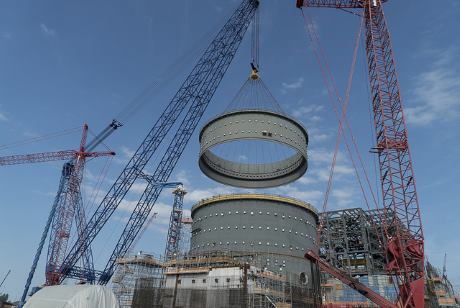Toshiba Corporation has agreed to pay a maximum of $2.168 billion to South Carolina Electric & Gas (SCE&G) and Santee Cooper under its guarantee obligations for the two AP1000 reactors under construction at VC Summer in South Carolina. The project owners say the additional cost to complete the units is expected to exceed this amount.
 |
| The third and final containment vessel ring being lifted into place at Summer 2 on 9 June (Image: SCE&G) |
Under the terms of the agreement, signed yesterday, Toshiba must make the payments in instalments during the period from October 2017 to September 2022. Of the $2.168 billion, $1.192 billion will go to SCE&G for its 55% ownership of the project, with $976 million to Santee Cooper, which owns 45%.
The Japanese company's obligations as the former parent company of Westinghouse are payable regardless of whether or not either or both units are completed, or the project is abandoned. They cannot be subjected to any subsequent increase or further challenges from Summer's owners, even in the event of an increase in future construction costs, but if the units are completed and construction costs are less than the specified maximum, Toshiba will be entitled to receive part of the difference.
The parental guarantee obligation was put in place by Toshiba and Summer's owners in 2008, when the engineering, procurement and construction (EPC) contract for the two AP1000 units was placed with Westinghouse. Westinghouse filed for Chapter 11 bankruptcy in March of this year.
Toshiba in June reached a similar agreement with the owners of the two AP1000s under construction at Vogtle in Georgia, with a cap of $3.68 billion for that project.
"With the Agreement announced today, the maximum limit of Toshiba's guarantees for all four nuclear power reactors of the US nuclear power construction projects have been definitively determined, and Toshiba has now eliminated the risk of additional payment related to its parent company guarantee," Toshiba said.
Toshiba said the amounts covered by the two agreements have already been incorporated into its outlook for fiscal 2016, reported in June. The maximum amounts will be incorporated into its FY2016 consolidated financial statements as the loss from discontinued operations.
Challenges to completion
Since Westinghouse's bankruptcy filing, Scana Corporation subsidiary SCE&G and Santee Cooper have been evaluating options for the Summer project. These have included continuing with the construction of both units; focusing on the construction of one unit, and delaying the construction of the other; continuing with the construction of one and abandoning the other; and abandoning both units.
The companies said yesterday that they were still working to determine the "most prudent path forward" for the project, but said they anticipated that the additional cost to complete both units beyond the amounts payable in connection with the project's EPC contract would materially exceed prior estimates by Westinghouse as well as the guarantee settlement payments from Toshiba.
Additionally, the units would need to be online before 1 January 2021 to qualify for production tax credits, under current tax rules. Construction of Summer 2 began in March 2013, with unit 3 beginning in November of that year. The plants are currently pencilled in for commercial operations in April 2020 and December 2020 respectively. However, Scana and Santee Cooper said that at this point they do not believe the units could be brought online until after the 1 January 2021 cut-off. "The project owners are considering these factors, as well as their future generation needs, in their evaluation of the project. Based on these considerations, the alternatives of completing both units or one unit are subject to significant challenges," they said.
Scana chairman and CEO Kevin Marsh said the company was committed to making a "financially responsible" decision for its customers and other stakeholders. "We are close to completing our analysis of the various options to determine the most prudent path forward," he said.
The interim assessment agreement between Summer's owners and Westinghouse under which work on the units has continued since the bankruptcy filing has been extended until 10 August, subject to court approval.
Researched and written
by World Nuclear News














